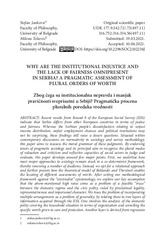Prikaz osnovnih podataka o dokumentu
Why are the institutional injustice and the lack of fairness omnipresent in Serbia? A pragmatic assessment of plural orders of worth
| dc.creator | Janković, Stefan | |
| dc.creator | Toković, Milena | |
| dc.date.accessioned | 2023-09-01T11:44:24Z | |
| dc.date.available | 2023-09-01T11:44:24Z | |
| dc.date.issued | 2021 | |
| dc.identifier.issn | 0038-0318 | |
| dc.identifier.uri | http://gery.gef.bg.ac.rs/handle/123456789/1430 | |
| dc.description.abstract | Recent results from Round 9 of the European Social Survey (ESS) indicate that Serbia differs from other European countries in terms of justice and fairness. Whereas the Serbian people’s dissatisfaction relating to unjust income distribution, unfair employment chances and political institutions may not be surprising, these findings still raise a dozen questions. Situated within contemporary discussions on normativity in sociology and survey methodology, this paper aims to reassess the moral grammar of these judgments. By endorsing tenets of pragmatic sociology and its principal aim to recognize the plural modes of valuation and criticism and reflective capacities of social actors to judge and evaluate, this paper develops around few major points. First, we underline how most major approaches to axiology remain stuck in a co-determinist framework, thereby renewing a number of dualisms. Instead, we opt for a relational approach and further present how the theoretical model of Boltanski and Thevénot enables the locating of different assessments of worth. After setting our methodological framework against the “externalist” epistemology, we explore our key assumption that the above-mentioned high rates come as a problem of a feasible “truce” between the domestic regime and the civic polity, ruled by proclaimed legality, representativeness and impersonal character. We trace the problem of incorporating multiple arrangements as a problem of generality, by relating these to two layers of information acquired through the ESS. One involves the analysis of the domestic polity covering the household situation in terms of organization and unveiling the specific worth given to care and protection. Another layer is derived from regression analysis which affirms that the absence of fairness in civic polity correlates with a higher degree of worth given to the domestic one, but also that the latter situation depicts a deeper ontological puzzle about making a mild transition to the assumed “horizontality” of civic matters. | sr |
| dc.language.iso | en | sr |
| dc.publisher | Beograd : Sociološko naučno društvo Srbije | sr |
| dc.publisher | Beograd : Univerzitet u Beogradu - Filozofski fakultet, Institut za sociološka istraživanja | sr |
| dc.rights | openAccess | sr |
| dc.rights.uri | https://creativecommons.org/licenses/by-nc/4.0/ | |
| dc.source | Sociologija | sr |
| dc.subject | justice | sr |
| dc.subject | fairness | sr |
| dc.subject | worth | sr |
| dc.subject | axiology | sr |
| dc.subject | pragmatic sociology | sr |
| dc.title | Why are the institutional injustice and the lack of fairness omnipresent in Serbia? A pragmatic assessment of plural orders of worth | sr |
| dc.type | article | sr |
| dc.rights.license | BY-NC | sr |
| dc.citation.volume | 63 | |
| dc.citation.issue | 2 | |
| dc.citation.spage | 236 | |
| dc.citation.epage | 261 | |
| dc.citation.rank | M23 | |
| dc.identifier.wos | 000697574400004 | |
| dc.identifier.doi | 10.2298/SOC2102236J | |
| dc.identifier.scopus | 2-s2.0-85111271685 | |
| dc.identifier.fulltext | http://gery.gef.bg.ac.rs/bitstream/id/3222/bitstream_3222.pdf | |
| dc.type.version | publishedVersion | sr |


